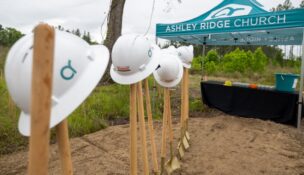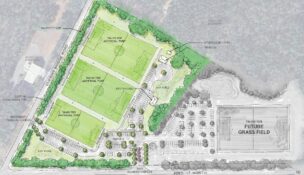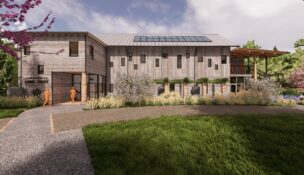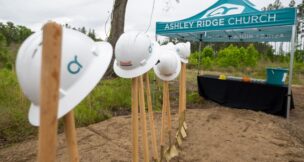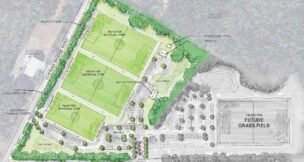Residential developments expand into Ravenel
Staff Report //October 19, 2021//

This story was originally published in the Oct. 4, 2021 edition of the Charleston Regional Business Journal.
A second planned unit development has been pitched for Ravenel, the rural town of 2,700 residents, showing signs that progress is now pushing outward from West Ashley.
Residents are concerned the movement could fundamentally change the rural nature of the area they call home.
Plans for the Tea Farm Tract, a proposed 400-unit planned development in Ravenel, and the related annexation of over 3,100 acres of land in Ravenel, were blessed Sept. 16 by the town’s planning and zoning commission, with a recommendation to limit density on over 2,000 acres of land outside the development.
The Tea Farm Tract would sit on 395 acres of land.
Rebecca Baird, who lives adjacent to the property and whose husband runs a grass-fed beef farm on their property, also opposed the annexation and development.
“I’m begging you to not annex this property; it will be devastating for this community, it will change the traffic flow, it will change how we have grown to live in this rural area,” she said.
A public hearing was scheduled be held by the full council and possible vote on Sept. 28.
Earlier this summer, the council approved and filed annexation plans for the Golden Grove Planned Development District, with 381 single-family homes and a commercial area to be built on 597 acres between Highway 17 and Old Jacksonboro Highway.
Similarly, the Tea Farm proposed development would sit along Old Jacksonboro Road and Highway 17, next to E.B. Ellington Elementary School, about 11 minutes from the intersection of Bees Ferry Road and Glenn McConnell in West Ashley.
The site is currently owned by the McLeod Lumber Company.
“We have owned this property for nearly a century…times change, things move on,” said William McLeod Rhodes, president of McLeod Lumber, at the commission meeting. “We would look for a developer who would do it well, and of course all regulations would be done well.”
Representatives from Thomas & Hutton, the land planning firm for the site, said they have been working on the land use plan for the site for a year-and-a-half.
Land planners stated at the meeting that the development may impact wetlands, including a half-acre of “isolated wetlands” on Landover Road.
Nearly two dozen neighbors and community stakeholders — including the Preservation Society of Charleston and The Coastal Conservation League — spoke out against the development at the Sept. 16 commission meeting, which lasted two-and-a-half-hours.
One resident said he would move away from Ravenel if the Tea Farm development was approved.
Others questions why 3,000 acres needed to be annexed for a project a fraction of that size and expressed concern that the town was setting itself up for a larger buildout on the site.
Opponents cited disruption to the site’s wildlife and wetlands, potentially impacting the nearby Charleston County Parks’ Caw Caw Interpretive Center, as well as increased traffic and strains on the area’s sewer system, which could potentially lead to future flooding issues.
“That’s just an incredible amount of land that can be developed like this,” said Tim Blackwell, who spoke at the meeting. “This could start a program where it will cascade (with) partnerships and LLCs adding another 1,000 acres. Once you start this, you’re going to ruin what you’ve got and what Mount Pleasant wishes what they had. We’re going to have Highway 17 South look like Highway 17 North.”
Thomas & Hutton presented a complete plan with renderings of sidewalks, streets and bike lanes. Plans include single-family homes and townhomes, parks and open space, a community center and 16 acre-commercial area that could support a grocery store.
The Tea Farm plan calls for slightly more than two single family homes per acre, and, when combined with townhomes, comes out to six units per acre overall. The density of Golden Grove is three homes per acre.
The board’s conditional recommendation was to limit density to one home per 25 acres in the 2,700 or so acres not expressly in the Tea Farm development, as outlined in the Charleston County’s comprehensive plan for Ravenel,
Rhodes did not return an email from CRBJ, asking if he was agreeable to the density amendment by the commission.
At the meeting, however, he shared that the McLeod family has additional tracts totaling 1,350 acres, but they are not seeking that to be annexed at this time.
In his opening statement, town administrator Mike Hemmer tried to quell some concerns about the development, including that the town does have the capacity to run sewer to the planned development and that existing sewer line limits mean the remaining 2,000 acres could not be built out in full.
During public comments, only one citizen spoke in favor of the Tea Farm development at the meeting: resident Todd Johnson, who said he’s lived in the area for 20 years. He said the development will bring younger people to the area.
“I think it’s a great idea for the young people coming up; they need a place to live and work,” he said. “Everything is growing out this way anyway. I think it’s a wonderful idea and I’m glad for the town to continue to grow. We need to grow.”







